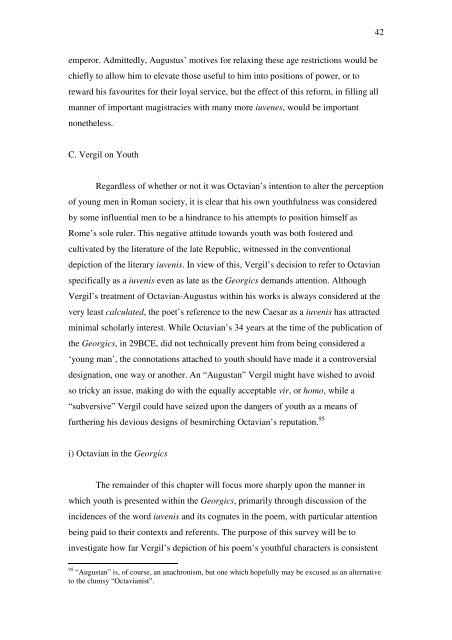Adam Bunni PhD thesis - Research@StAndrews:FullText ...
Adam Bunni PhD thesis - Research@StAndrews:FullText ...
Adam Bunni PhD thesis - Research@StAndrews:FullText ...
Create successful ePaper yourself
Turn your PDF publications into a flip-book with our unique Google optimized e-Paper software.
emperor. Admittedly, Augustus’ motives for relaxing these age restrictions would be<br />
chiefly to allow him to elevate those useful to him into positions of power, or to<br />
reward his favourites for their loyal service, but the effect of this reform, in filling all<br />
manner of important magistracies with many more iuvenes, would be important<br />
nonetheless.<br />
C. Vergil on Youth<br />
Regardless of whether or not it was Octavian’s intention to alter the perception<br />
of young men in Roman society, it is clear that his own youthfulness was considered<br />
by some influential men to be a hindrance to his attempts to position himself as<br />
Rome’s sole ruler. This negative attitude towards youth was both fostered and<br />
cultivated by the literature of the late Republic, witnessed in the conventional<br />
depiction of the literary iuvenis. In view of this, Vergil’s decision to refer to Octavian<br />
specifically as a iuvenis even as late as the Georgics demands attention. Although<br />
Vergil’s treatment of Octavian-Augustus within his works is always considered at the<br />
very least calculated, the poet’s reference to the new Caesar as a iuvenis has attracted<br />
minimal scholarly interest. While Octavian’s 34 years at the time of the publication of<br />
the Georgics, in 29BCE, did not technically prevent him from being considered a<br />
‘young man’, the connotations attached to youth should have made it a controversial<br />
designation, one way or another. An “Augustan” Vergil might have wished to avoid<br />
so tricky an issue, making do with the equally acceptable vir, or homo, while a<br />
“subversive” Vergil could have seized upon the dangers of youth as a means of<br />
furthering his devious designs of besmirching Octavian’s reputation. 95<br />
i) Octavian in the Georgics<br />
The remainder of this chapter will focus more sharply upon the manner in<br />
which youth is presented within the Georgics, primarily through discussion of the<br />
incidences of the word iuvenis and its cognates in the poem, with particular attention<br />
being paid to their contexts and referents. The purpose of this survey will be to<br />
investigate how far Vergil’s depiction of his poem’s youthful characters is consistent<br />
95 “Augustan” is, of course, an anachronism, but one which hopefully may be excused as an alternative<br />
to the clumsy “Octavianist”.<br />
42

















